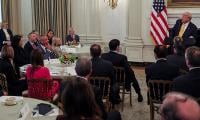KARACHI: The Federation of Pakistan Chambers of Commerce and Industry (FPCCI) has proposed introducing taxation reforms in federal budget 2023-24 for broadening the tax base on international best-practices and principles of simplification of the taxation system.
FPCCI President Irfan Iqbal Sheikh on Tuesday said, “We need a business-friendly and pro-growth budget to play the catalytic role in putting the economy on the right track.”
Pakistan’s tax to GDP ratio is only 10 percent, indicating that the taxation system it is not balanced, broad-based and simplified.
Heavy reliance on indirect taxation and surcharges is damaging the economy, and, taxes are insufficient for debt servicing, defence, social welfare and public-sector development programmes, he added.
FPCCI chief added that taxpayers lack knowledge of their obligations, and major taxation policy changes are not supported by the required changes in the administrative framework.
FBR lacks adequate organisational structure, business processes, business-friendly facilities, institutional budget and sufficient pool of human resources. In addition to that, FBR and its staff are not equipped with the current technological developments and the resultant digitalisation.
Sheikh enlisted basic principles to provide the foundation to the government for its taxation policies. The first of those principles is that the taxation policies should support businesses to diversify into untapped international markets via an enabling environment for export-oriented businesses.
The second proposal in that the taxation system should be facilitative enough to attract foreign direct investment (FDI) for sustained economic and business growth.
He asked the government to maintain macroeconomic stability as a prerequisite for inclusive and sustained development, with the taxation system adding ease in economic activities, rather than operating as a notice-manufacturing factory.
The third principle should be generating desired revenues from the existing taxation system, which requires the government to review obsolete laws, regulations and taxation rates, and develop an efficient tax administration with well-trained, well-equipped, professional and motivated human resources.
The fourth principle in the proposals is that there should be harmony and convergence in the objectives of taxation, industrial, exports and fiscal objectives. Or else none of these policies will work.
Zakaria Usman, Convener of FPCCI’s Budget Advisory Council, said that although the volume of revenue collection has increased from Rs3,112 billion in FY16 to Rs6,148 billion in FY21, which shows nearly twofold growth of revenue collection in six years, during the same period, tax-to-GDP ratio continued to remain stagnant in the vicinity of 10 percent of GDP. “No country can post a substantive economic growth with this kind of an abysmally low tax-to-GDP ratio,” he added.
In the Federal Directorate of Education girls are learning AI in the computer lab. — APP/FileKARACHI:...
Lucky cement factory can be seen in this image. — Lucky Cement website/FileKARACHI: Lucky Cement Limited announced...
The Standard Chartered bank logo is seen at their headquarters in London, Britain, July 26, 2022. — ReutersKARACHI:...
A view of a Shell petrol pump. — Online/FileKARACHI: Wafi Energy Pakistan is set to upgrade its systems to SAP’s...
An undated image of gold jewelry displayed at a store. — AFP/FileKARACHI: Gold prices fell by Rs2,000 per tola on...
A sign for customers shopping for eggs at Trader Joe's hangs by the cartons in Merrick, New York, US, February 16,...







